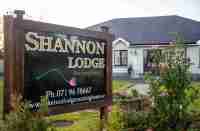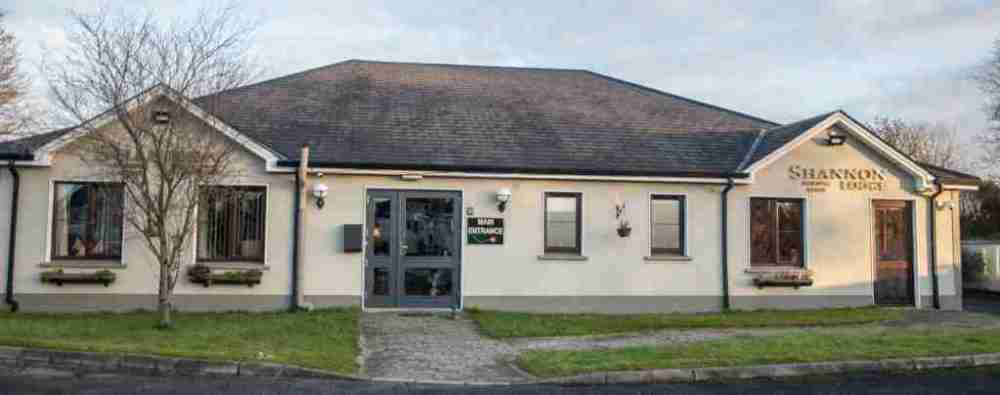
As you walk through the doors of Shannon Lodge Nursing Home in Rooskey, County Roscommon you can instantly sense you are in a home away from home. Earlier this week, the Roscommon People team had a lovely opportunity to speak with some residents of ‘Shannon Lodge’ about their memories of Christmases long, long ago….
Eileen’s memories of Irish in UK
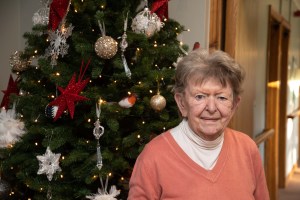
The first lady I was greeted by in Shannon Lodge was Mrs Eileen O’Neill. Born in 1939 near Keshcarrigan, Co Leitrim, Eileen spent a good portion of her working life in the UK. Eileen began recalling the Christmases of her childhood – back in the 1940s – when Ireland was a very different place to now.
Eileen regaled me with the tale of her red coat, a Christmas gift from her mother. But it wasn’t just any red coat, it was a beautiful red coat that she coveted for some time, such finery being a rare thing around Keshcarrigan in those years.
The coat was owned by a neighbour and was passed on to Eileen’s mother who turned it inside out, putting her alteration skills to good use and turning the red coat into a beautiful present that Eileen thought was “worth its weight in gold”.
Of her time over the years in Birmingham, London and Wales, Eileen had great admiration for the solidarity of the working Irish in the UK. In particular, she had great admiration for the support offered to the Irish in Birmingham by Saint Chad’s Cathedral, especially at Christmas.
“It was a home away from home for the Irish in England, particularly for working men and women who perhaps fell on hard times, but even if they hadn’t they were always welcome for Christmas Dinner at St Chad’s”.
Three weeks: that’s how long it would take a letter to make it home for Christmas.
“One year I posted home, I think it was seven pounds, for the Christmas” recalls Eileen. The amount of money she described was “…like a millionaire’s wage to those back home”.
Every second week throughout her working life in England and Wales, Eileen would send home five pounds to Ireland, a story that will resonate with many people who lived through the impoverished decades of the first half of the 20th century, and indeed into the 1980s.
Working in hospitality most of her life, Eileen told me there was many a morning, at 6 am, that she’d come along and put her hands into the cold, icy waters of the sink, preparing for the day’s work ahead.
“On occasion there’d be a supervisor looking over your shoulder at you”.
I asked Eileen: “Would they ever roll up their sleeves and help out?”
“No,” she said: “They wouldn’t lower themselves to that!”
If you asked me to sum up Eileen after our brief chat, which I’m sure we could have continued for many hours more, hand on heart I’d have to say she was one of the sharpest, wittiest and most pleasant ladies I ever had the pleasure of meeting.
Patricia ‘happy and healthy at 94’
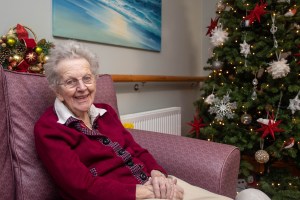
My next chat was with one Mrs Patricia Keeley, in the beautifully appointed dining room. Patricia was born and raised in Cloonaufill Towland, Rooskey. When I asked if she went to National School in Rooskey, I was greeted with a direct honesty: “Sure where else would I have gone!” Her charm and wit were matched by her mischievous grin.
Feeling as though I probably already knew the answer, I asked Patricia: “So, tell me, Patricia, did Santa Claus bring plenty of presents at Christmas time when you were a bit younger than you are today?”
She was quick-witted enough to say: “Aye, lots!” It was said with a heartwarming tone, followed by an endearing chuckle.
In talking about the Christmas gifts Patricia received from Santa as a child, the one that stood out for her was a baby doll.
Curious to know, and forgoing the general chivalry associated with never asking a lady her age, I plucked up the courage to ask Patricia her’s. As we worked backwards from 2023 to 1929, I think we were both equally shocked to realise Patricia will be celebrating her 94th Christmas this year.
As to that pending 94th birthday, Patricia joked about “making the 100” and how great it is to be “happy and healthy at 94”.
Patricia recalled watching the first ever broadcast of the Late Late Show on July 6th, 1962, a show which was hosted by the late and no doubt great, Gay Byrne. That was her earliest recollection of having a television in the house. Before television was mainstream, it was all about the wireless (radio): “I used to love listening to Irish music playing on what was then Radio Éireann”.
As we wrapped up our lovely chat, Patricia couldn’t let me go without reminding me that she was a local of Rooskey and that she knew the Reynolds family well, including former Taoiseach Albert and his brothers Jim and Joe.
There was great banter between the caregivers and residents throughout my visit. I asked Patricia how the staff were looking after her. She said they were “very nice and lovely”.
Patricia’s heartwarming smile, ladylike manner, and her charming wit would put a smile on your face and a song in your heart.
Rosaleen’s Declan Nerney connection
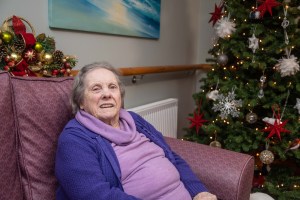
My next fireside chat was with Mrs Rosaleen Cullen, from Drumlish, Co. Longford, and I got an expert lesson in the economics of rearing and selling turkeys in times long since gone by.
“My mother would raise thirteen turkeys for Christmas. A baker’s dozen” began Rosaleen. “It would take four weeks to the day from an egg being laid to the day they’d hatch. And we’d feed them up to Christmas.
“We’d only keep hen turkeys at home. I think it would be about 2 and 6 to have the hen covered by a stag turkey, some would call them toms,” explained Rosaleen.
And yet again my ignorance was exposed: “And why would you pay another family 2 and 6 to cover a hen when you could have a stag hen of your own?”
“Sure that would be inbreeding. The pedigree mattered in the rearing of good turkeys,” explained Rosaleen. “There’d be one or two families we’d bring the hens to have them covered maybe once or twice a year”.
“Do you remember who you’d bring them to, the families, I mean?” I asked next.
“Oh, I do, of course, Nerney’s were only up the road. Declan was a lovely nice lad”.
It took me a few seconds to put one and two together and realise we were talking about none other than the famous country singer Declan Nerney.
“He’s still a fine nice lad” Rosaleen assured me.
“Would you like to see him again soon?”
“Arra, I suppose I would,” said Rosaleen, before asking: “Do you think he’d come for a visit?”
I told her I wasn’t sure if Joe Finnegan had any sway with him but if he did we’d try to get in contact with him.
Rosaleen recalls that as a child there was always great excitement in waiting for Santa to come: “We wouldn’t get as much as we’d asked for and we certainly wouldn’t get as much as they’d get today. But we always got something and were glad of whatever we got”.
Biscuits and tea arrived for the residents who had gathered in the dining room for our chat, prompting me to ask Rosaleen: “What would you get in the line of sweets on Christmas Day?”
“You’d be glad to get a caramel sweet, very glad of it”.
Curious about the changes over time, I asked Rosaleen if she remembered any informal traditions that have died out over the years. She recalled the postmen of old would be greatly delayed if they had deliveries on Christmas Eve: “They’d be as drunk as a Lord on Christmas Eve, going from house to house. It was a tradition that the postman would come in off his bike and share a glass of whiskey on Christmas Eve”.
Sean’s vivid memories of Christmases past
At this stage, I was privileged to get the opportunity to sit and speak one-to-one with a great friend, mentor and gentleman of the highest order, former Fine Gael councillor, Sean Beirne.
Before we got into his personal experiences of Christmas, and memories from childhood, we began our chat by continuing the economics lesson. I was transported back to my youth as Sean reminded me that the selling of turkeys at Christmas would often be how farming families would pay their bills which accrued during the year with local merchants.
(As an aside, growing up in Strokestown in the 1990s, we had a book in every shop. There was a book in Beirne’s, in Hanly’s, in Spar and in Strokestown Hardware).
Continuing in an economic frame of mind, Sean advised me that the Strokestown Christmas Fair/Market would be held on the last Friday before Christmas.
“The town would be mighty busy” he recalled. “Strokestown was a fantastic market town in those days” he said, before adding that it remains a good trading town to this day.
The former county councillor explained: “For a lot of farming families the turkeys that would be sold before the Christmas would pay off whatever was on the books with local shopkeepers and merchants”.
A great conversation then developed with Sean who told me he was born in 1944 and was raised in Derryfadden, Strokestown. Sean was the eldest of five, his sister Mary being the youngest. He recalled there always being great excitement and a sense of joy in the build-up to the Yuletide festivities.
“I distinctly remember receiving the board game Snakes & Ladders as a young boy, as a gift from Santa Claus. On another occasion, I received a spinning top. They were the types of gifts you could expect back in the 1940s and ‘50s”.
Sean said that for the most part, young girls would receive dolls: “Some were made of wood, others more lifelike. If there was a few extra pounds in the house a young girl would be lucky to get a doll’s house along with their doll”.
Christmas morning Mass would be the first thing on the agenda on a day which was strictly to be celebrated with family: “I don’t recall a midnight Mass when I was a boy. But there would be two Masses on Christmas Day.
“My home place was four and a half miles to Tulsk and four and a half miles to Strokestown, I was equidistant between the two churches”.
I asked would the family have had a car at the time – again a question exposing my own ignorance of the day-to-day reality of rural living in the 1940s and 50s!
Sean replied: “We’d travel to Mass on a horse and trap, which was a lovely way to travel in those days. It really was”.
Sean said you’d fast from midnight the night before receiving communion, and it would be very strictly observed.
Again being a mischievous elf, given the time of year and craic that was being had, I put it to Sean that we understand that pubs were strictly always closed on Christmas Day. “But were there any local haunts that might let one or two in for a drink after Mass?” I asked.
“No,” Sean said, “it was always very strictly observed as a family day”.
St Stephen’s Day was the beginning of the end of the Christmas season: “It was always a day of celebration, the weeks and months of work and stress and build-up were over and everyone could unwind. And just as the churches would be thronged on Christmas Day, the local pubs would be filled on St Stephen’s Day and night”.
“Now, many a one would have done the Wrenboys,” Sean recalled.
“Did you ever do it yourself, Sean?”
And with a jolly chuckle, he said: “I think I did it once, but I don’t remember having much to offer in terms of singing and dancing. So, I don’t think there was much got out of it”.
I asked Sean if he feels that Christmas has changed for the better or worse over the years?
Stopping and thinking, presumably to get his words right, as Sean has always done throughout his life, he delivered a most sincere response to my arguably pointed question.
“Well, I’ve always loved the build-up to Christmas. In recent times, I suppose, there is more of a sort of magic in young children nowadays that’s nice and probably wasn’t around when I was a child. Or maybe it just wasn’t the same. So in that sense, it’s probably changed for the better. Children can probably enjoy it more, but we also have to remember those who have less at this time of year”.


